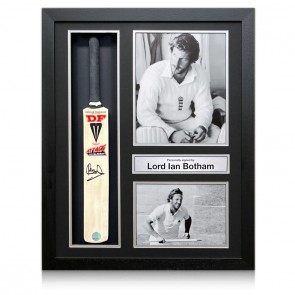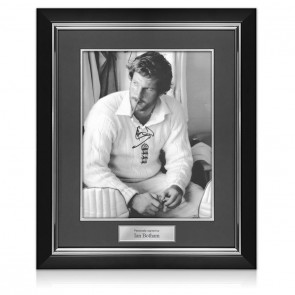Born on November 24, 1955, Ian Terence Botham was not only England's most dominant cricketer of the Eighties, but the country's leading sports personality. Outspoken, uninhibited and outrageously talented, he delighted the public and infuriated the establishment in equal measures.
Botham first imprinted himself on the public consciousness in 1974, when as a fearless teenager batting for Somerset he was struck in the mouth by a bouncer from the fearsome West Indian bowler, Andy Roberts. Botham simply spat out a couple of teeth and carried on to play a matchwinning innings.
He made his debut for England in 1977 and within a year was their undisputed number one all rounder. His ability to conjure wickets from nowhere, often with rank balls, and the freedom with which he smashed bowlers of the highest calibre to all corners of the ground, meant he quickly became a national treasure.
He was rewarded with the captaincy in 1980, but a string of poor results, most of them against the all-conquering West Indies side of Joel Garner, Viv Richards and Clive Lloyd, saw him leading out England in the second Ashes test of 1981 at Lords with his position distinctly precarious. Botham was dismissed for a pair and returned to an embarrassing silence in the pavilion; he lost his captaincy, resigning before he was sacked.
There followed the most remarkable sequence of sporting performances cricket has ever seen. With Mike Brearley recalled as captain, Beefy resumed his position in the ranks, and midway through the third test England had been forced to follow on. They found themselves 105-5, still 222 runs short of forcing Australia to bat again, when Botham walked out to bat.
Two more wickets soon fell, to leave England staring defeat in the face at 135-7. Botham began swinging the bat, to produce a sensational innings of 149 not out, and leaving the Aussies needing 128 to win. An incredible piece of hostile bowling from Bob Willis the next day, taking 8 for 43, skittled the Australians out for only 111, to secure an improbable victory.
The next test match, at Edgbaston, looked almost as hopeless, when the Australians found themselves on 105-5 chasing 151 to win. Up stepped Botham to take five wickets for only one run in 28 balls to give England victory by 29 runs. England wrapped up the series 3-1, with Botham named Man of the Series, having hit 399 runs and taken 34 wickets.
Dogged by back injuries, his prowess declined in later years, but he was still capable of thrilling the crowds. Banned by persistent newspaper demand in 1986 for smoking cannabis, he was recalled at The Oval against New Zealand, and with his second and 12th balls took the two wickets he needed to equal and pass Dennis Lillee's then-world record of 355 Test wickets. "Who writes your scripts?" asked Graham Gooch.
Botham has also been a prolific fund-raiser for charity, in particular leukemia research. He has undertaken 12 long-distance walks and raised more than £12 million as a result. His efforts have deservedly earned him a knighthood. In July 2020, it was announced that Botham would be elevated to the House of Lords and that he would sit as a crossbench peer






























